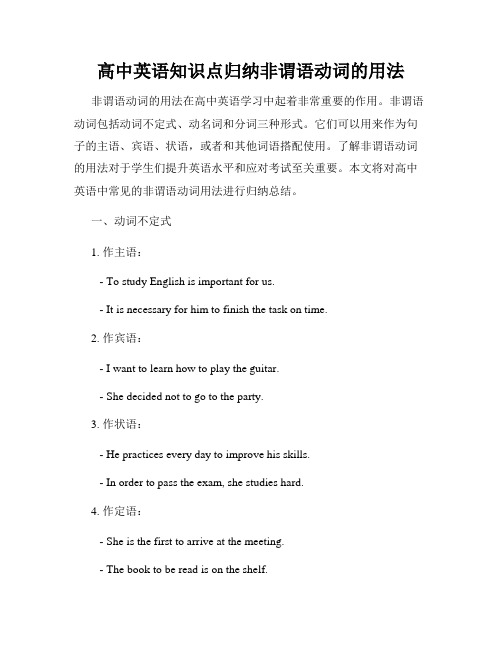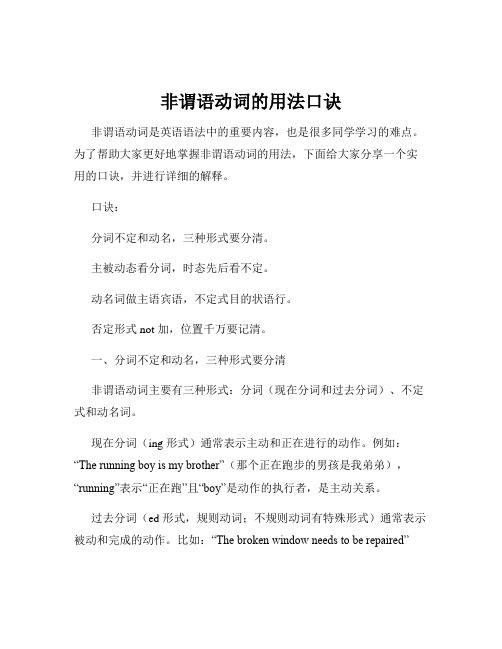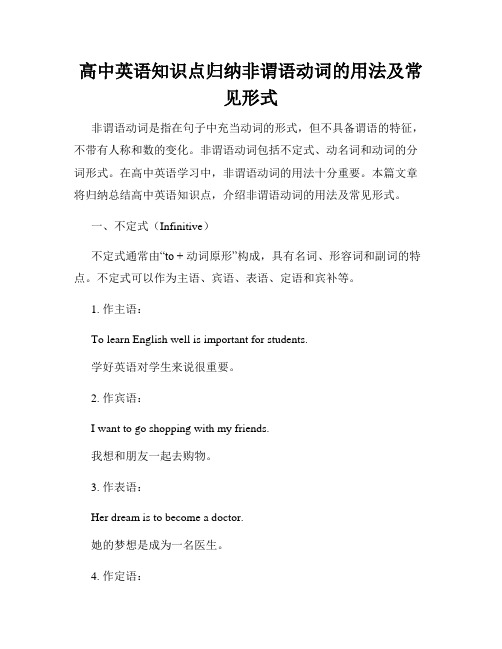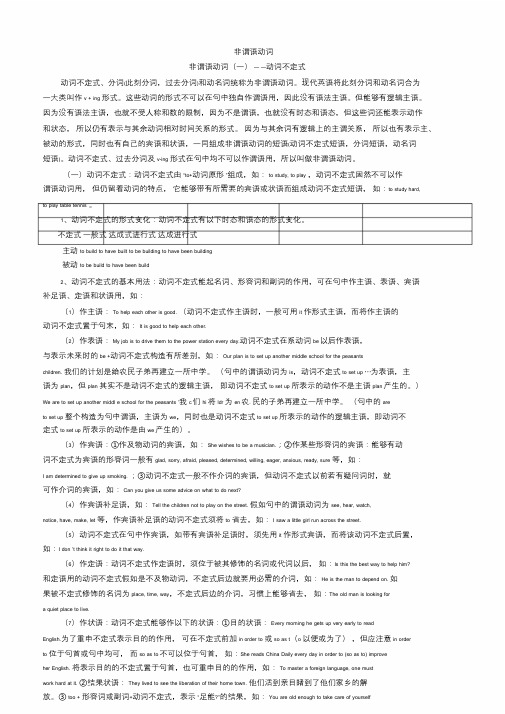最新非谓语动词用法搭配复习进程
高中英语知识点归纳非谓语动词的用法

高中英语知识点归纳非谓语动词的用法非谓语动词的用法在高中英语学习中起着非常重要的作用。
非谓语动词包括动词不定式、动名词和分词三种形式。
它们可以用来作为句子的主语、宾语、状语,或者和其他词语搭配使用。
了解非谓语动词的用法对于学生们提升英语水平和应对考试至关重要。
本文将对高中英语中常见的非谓语动词用法进行归纳总结。
一、动词不定式1. 作主语:- To study English is important for us.- It is necessary for him to finish the task on time.2. 作宾语:- I want to learn how to play the guitar.- She decided not to go to the party.3. 作状语:- He practices every day to improve his skills.- In order to pass the exam, she studies hard.4. 作定语:- She is the first to arrive at the meeting.- The book to be read is on the shelf.5. 作表语:- My dream is to become a doctor.- The important thing is to keep calm.6. 作补语:- I need you to help me with the project.- He made her laugh.二、动名词1. 作主语:- Learning a new language requires patience. - Swimming is good for health.2. 作宾语:- I enjoy reading books in my free time.- She admitted stealing the money.3. 作状语:- He left without saying goodbye.- She passed the test by studying hard.4. 作定语:- The running water is very clean.- I heard someone singing in the distance.5. 作表语:- His favorite hobby is playing basketball.- The key to success is hard work.6. 作补语:- I started regretting not studying harder.- They kept us waiting for hours.三、分词1. 现在分词(-ing形式):- The running boy is my brother.- She saw a smoking man on the street.2. 过去分词(-ed/-en形式):- The broken vase needs to be replaced.- They were excited by the surprising news.3. 作状语:- Enjoying the beautiful scenery, we went for a walk.- Being well-prepared, she felt confident in the interview.4. 作定语:- The lost cat was found by its owner.- The written report should be handed in by tomorrow.5. 作补语:- She was surprised to find her car stolen.- I felt exhausted after running for an hour.综上所述,高中英语中的非谓语动词有动词不定式、动名词和分词三种形式,它们在句子中能够充当不同的成分,起到丰富语言表达和提高语言准确性的作用。
非谓语动词的用法口诀

非谓语动词的用法口诀非谓语动词是英语语法中的重要内容,也是很多同学学习的难点。
为了帮助大家更好地掌握非谓语动词的用法,下面给大家分享一个实用的口诀,并进行详细的解释。
口诀:分词不定和动名,三种形式要分清。
主被动态看分词,时态先后看不定。
动名词做主语宾语,不定式目的状语行。
否定形式 not 加,位置千万要记清。
一、分词不定和动名,三种形式要分清非谓语动词主要有三种形式:分词(现在分词和过去分词)、不定式和动名词。
现在分词(ing 形式)通常表示主动和正在进行的动作。
例如:“The running boy is my brother”(那个正在跑步的男孩是我弟弟),“running”表示“正在跑”且“boy”是动作的执行者,是主动关系。
过去分词(ed 形式,规则动词;不规则动词有特殊形式)通常表示被动和完成的动作。
比如:“The broken window needs to be repaired”(那个打破的窗户需要修理),“broken”表示“被打破的”,窗户是“被打破”,是被动关系。
不定式(to +动词原形)具有多种含义,如表示目的、将来等。
像:“To pass the exam, he studies hard”(为了通过考试,他努力学习),“To pass the exam”表示目的。
动名词(动词的ing 形式)具有名词的特征,可以作主语、宾语等。
例如:“Swimming is my favorite sport”(游泳是我最喜欢的运动),“swimming”在这里作主语。
二、主被动态看分词,时态先后看不定在判断使用现在分词还是过去分词时,关键要看主被动关系。
如果动作是主语主动发出的,就用现在分词;如果动作是主语承受的,就用过去分词。
例如:“The teacher was satisfied with the students' answered questions”(老师对学生们回答的问题很满意),“answered”是过去分词,因为“questions”是“被回答”的。
高中英语知识点归纳非谓语动词的用法及常见形式

高中英语知识点归纳非谓语动词的用法及常见形式非谓语动词是指在句子中充当动词的形式,但不具备谓语的特征,不带有人称和数的变化。
非谓语动词包括不定式、动名词和动词的分词形式。
在高中英语学习中,非谓语动词的用法十分重要。
本篇文章将归纳总结高中英语知识点,介绍非谓语动词的用法及常见形式。
一、不定式(Infinitive)不定式通常由“to + 动词原形”构成,具有名词、形容词和副词的特点。
不定式可以作为主语、宾语、表语、定语和宾补等。
1. 作主语:To learn English well is important for students.学好英语对学生来说很重要。
2. 作宾语:I want to go shopping with my friends.我想和朋友一起去购物。
3. 作表语:Her dream is to become a doctor.她的梦想是成为一名医生。
4. 作定语:The best way to learn a foreign language is to practice more.学习外语的最好方法就是多练习。
5. 作宾补:She asked me to finish the report as soon as possible.她要求我尽快完成报告。
二、动名词(Gerund)动名词以动词的现在分词形式(-ing)作为主要构词方式,具有名词的特点,可作为名词的任何功能。
1. 作主语:Studying hard is the key to success.努力学习是取得成功的关键。
2. 作宾语:I enjoy singing in the shower.我喜欢在淋浴时唱歌。
3. 作表语:His favorite activity is swimming.他最喜欢的活动是游泳。
4. 作定语:I have a writing class tomorrow.我明天有一节写作课。
5. 作宾补:They felt like going for a walk after dinner.晚饭后他们想去散步。
高中英语知识点归纳非谓语动词的形式与用法技巧

高中英语知识点归纳非谓语动词的形式与用法技巧高中英语知识点归纳:非谓语动词的形式与用法技巧介绍:非谓语动词是英语语法中一个重要的概念,它可以作为动词的其他形式出现在句子中,除了主要动词之外。
在高中英语学习过程中,掌握非谓语动词的形式与用法技巧对于正确理解和运用英语语法非常重要。
本篇文章将归纳总结非谓语动词的基本形式及其常用的用法技巧,帮助读者更好地掌握这一知识点。
一、非谓语动词的基本形式非谓语动词包括不定式、动名词和现在分词。
它们的形式如下:1. 不定式:to + 动词原形(例如:to go)2. 动名词:动词原形 + -ing(例如:going)3. 现在分词:动词原形 + -ing(例如:going)二、非谓语动词的用法技巧下面将分别介绍不定式、动名词和现在分词的用法技巧。
1. 不定式的用法技巧:(1)作为主语:不定式作为主语时,常用it作形式主语,而将真正的主语放在不定式的后面。
例如:It is important to learn English well.(学好英语很重要。
)(2)作为宾语:动词后接不定式作为宾语时,不定式可以用于表示意图、目的、愿望、能力等。
例如:I want to go shopping.(我想去购物。
)(3)作为状语:不定式可作为状语修饰动词、形容词或副词,常表示目的、结果、原因等。
例如:He ran fast to catch the bus.(他快跑着去赶公共汽车。
)2. 动名词的用法技巧:(1)作为主语:动名词作为主语时,常用单数形式,并与动词以及代词的第三人称单数形式连用。
例如:Swimming is a good sport.(游泳是一项好运动。
)(2)作为宾语:动词后接动名词作宾语时,常与动词不定式有一定的区别,如愿望、计划、避免等。
例如:I enjoy playing basketball.(我喜欢打篮球。
)(3)作为介词宾语:动名词可作为介词的宾语,常见的介词有:for, of, about, with等。
非谓语动词的用法与变化

非谓语动词的用法与变化非谓语动词是指动词的形式不带有主语和谓语的情况下使用。
在英语中,非谓语动词包括动词不定式、动名词与现在分词。
非谓语动词的用法灵活多样,能够在句子中起到名词、形容词或副词的作用。
本文将介绍非谓语动词的用法与变化,并通过例句进行说明。
一、动词不定式(Infinitive)动词不定式是动词的原形加上to构成,没有人称和数的变化。
它可以作为主语、宾语、表语、宾语补足语等。
动词不定式常常与情态动词、助动词以及感官动词等连用。
1. 作主语:- To learn a foreign language is beneficial.学习一门外语是有益的。
- To travel around the world is my dream.周游世界是我的梦想。
2. 作宾语:- She wants to become a doctor.她想要成为一名医生。
- I plan to finish reading this book tonight.我计划今晚读完这本书。
- Her dream is to become a famous singer.她的梦想是成为一名著名的歌手。
- The most important thing is to be yourself.最重要的是做你自己。
4. 作宾语补足语:- They found it challenging to solve the puzzle.他们发现解决这个谜题很有挑战性。
- She considers him to be her best friend.她认为他是她最好的朋友。
二、动名词(Gerund)动名词是动词加上-ing构成,具有名词的特征,在句子中可以充当主语、宾语、表语、介词的宾语等。
1. 作主语:- Reading books is my favorite hobby.阅读书籍是我的爱好。
- Swimming is good exercise for the whole body.游泳对整个身体有益。
高中英语非谓语动词用法详解和练习含详解

非谓语动词非谓语动词(一)——动词不定式动词不定式、分词(此刻分词,过去分词)和动名词统称为非谓语动词。
现代英语将此刻分词和动名词合为一大类叫作 v + ing 形式。
这些动词的形式不可以在句中独自作谓语用,因此没有语法主语。
但能够有逻辑主语。
因为没有语法主语,也就不受人称和数的限制,因为不是谓语,也就没有时态和语态,但这些词还能表示动作和状态,所以仍有表示与其余动词相对时间关系的形式。
因为与其余词有逻辑上的主谓关系,所以也有表示主、被动的形式,同时也有自己的宾语和状语,一同组成非谓语动词的短语(动词不定式短语,分词短语,动名词短语)。
动词不定式、过去分词及 v-ing 形式在句中均不可以作谓语用,所以叫做非谓语动词。
(一)动词不定式:动词不定式由“to+动词原形”组成,如: to study, to play ,动词不定式固然不可以作谓语动词用,但仍留着动词的特点,它能够带有所需要的宾语或状语而组成动词不定式短语,如:to study hard,to play table tennis 。
1、动词不定式的形式变化:动词不定式有以下时态和语态的形式变化。
不定式一般式达成式进行式达成进行式主动to build to have built to be building to have been building被动to be build to have been build2、动词不定式的基本用法:动词不定式能起名词、形容词和副词的作用,可在句中作主语、表语、宾语补足语、定语和状语用,如:(1)作主语: To help each other is good. (动词不定式作主语时,一般可用 it 作形式主语,而将作主语的动词不定式置于句末,如: It is good to help each other.(2)作表语: My job is to drive them to the power station every day.动词不定式在系动词be以后作表语,与表示未来时的 be +动词不定式构造有所差别,如: Our plan is to set up another middle school for the peasantschildren. 我们的计划是给农民子弟再建立一所中学。
英语语法 非谓语动词 特殊用法和做题七原则-江苏省盐城市2021届高三一轮复习
非谓语动词特殊用法1. have的用法1). 作实意动词,意为“有”sb. have sth. (1)to do (主语完成非谓语动作) I have lots of clothes to wash.(2)to be done(某事被作,但与主语无关)“Do you have any clothes to be washed,Tom?” asked Mum.2). 作使役动词,意为“让,使”主语+have sb. do sth. = get sb. to do sth.The teacher had me clean the blackboard.主语+have sb. / sth. doing = keep sb./ sth. doingDon't have the lights burning all the time.主语+have sb. / sth. done = get sb./sth. doneI had my pocket picked on the bus yesterday.3)can’t / won’t have sb/sth. doing不能容忍某事发生We won't have you talking to your mother like that again.2. 非谓语动词主动表被动1.)need/want/require/deserve +doing/to be done2.)be worth doing sth. 没有be worth being donebe worthy of being donebe worthy to be donebe worthwhile to do sth.be worthwhile doing sth.His good deed deserves praising/to be praised.=His good deed is worth praising.3.)sb. is to blame; sth. is to let(某物有待出租)The driver is to blame for the accident.4.)sth. is +adj. +to do 结构中,不定式与句子主语有动宾关系时,用不定式的主动形式5.)make sth. adj. to do6)feel/consider/find/believe/+sth. +adj. +to do7)be + adj. + to do sth.用于此类句型的形容词有:nice,easy,(un)fit,hard,difficult,important,(im)possible,(un)pleasant,interesting, (un)comfortable等The picture is pleasant to look at.The sentence is easy to understand.The water in the river is unfit to drink.I feel English not easy to learn well.3. be+过去分词+to do sth. 或be+过去分词+to(介词)+名词/doing 的用法:这个考点非常重要be lost in/ be equipped with /be devoted to/ be stuck in1) 当在句子中充当定语,状语或补语时,非谓语动词形式就是把be动词去掉。
非谓语动词用法初三
非谓语动词用法初三对于初三的同学们来说,非谓语动词是英语语法中的一个重点和难点。
非谓语动词在句子中不充当谓语,却有着重要的作用。
接下来,让我们一起深入了解非谓语动词的用法。
非谓语动词主要包括动词不定式(to do)、动名词(doing)和分词(现在分词 doing 和过去分词 done)。
首先,咱们来聊聊动词不定式。
动词不定式具有名词、形容词和副词的特征,可以在句子中充当主语、宾语、定语、状语等成分。
作主语时,为了避免句子头重脚轻,常用 it 作形式主语,把真正的主语动词不定式后置。
比如:“It is important to learn English well”(学好英语很重要。
)作宾语的情况也不少见。
一些动词后常接动词不定式作宾语,比如“want to do”(想要做)、“decide to do”(决定做)等。
当作定语时,动词不定式通常放在被修饰的名词或代词之后。
例如:“I have a lot of homework to do”(我有很多作业要做。
)在状语方面,它可以表示目的、结果等。
“He came here to see me”(他来这儿是为了看我。
)这就是表示目的。
接下来是动名词。
动名词具有名词的特征,在句中可充当主语、宾语、表语等。
作主语时,谓语动词要用单数形式。
例如:“Swimming is good for your health”(游泳对你的健康有好处。
)作宾语时,常见的动词有“enjoy doing”(喜欢做)、“finish doing”(完成做)等。
然后是分词。
现在分词表示主动和进行,过去分词表示被动和完成。
现在分词作定语时,通常放在被修饰的名词之前。
比如:“a sleeping baby”(一个正在睡觉的婴儿)。
过去分词作定语时,一般放在被修饰的名词之后。
像“the book written by Lu Xun”(鲁迅写的书)。
在作状语时,现在分词表示伴随、原因等。
高中英语知识点归纳非谓语动词的复合用法与考点
高中英语知识点归纳非谓语动词的复合用法与考点一、复习非谓语动词的基本概念非谓语动词是指在句子中起到动词作用,但不具备时态和人称的形式。
英语中常见的非谓语动词有不定式、动名词和分词。
在高中英语中,学生需要掌握非谓语动词的基本用法和搭配。
二、复合用法1. 非谓语动词 + to do在这种结构中,不定式to do作为非谓语动词的形式,常常用作目的、原因、结果、条件、目标、方法等方面的表达。
比如:- I went to the bookstore to buy some new books.(我去书店是为了买些新书。
)- He had to study hard in order to pass the exam.(他不得不努力学习以通过考试。
)- She practices playing the violin every day to improve her skills.(她每天练习拉小提琴以提高她的技能。
)2. 非谓语动词 + doing这种结构中,动名词doing作为非谓语动词的形式,常常用作主语、宾语、定语等。
比如:- Doing exercises regularly is good for our health.(经常做运动对我们的健康有好处。
)- I enjoy listening to music in my free time.(我在空闲时间喜欢听音乐。
)- We visited the village, seeing the traditional houses and experiencing the local culture.(我们参观了村庄,看到传统的房屋并体验了当地的文化。
)3. 非谓语动词 + done在这种结构中,done作为非谓语动词的形式,常常用作表语、宾语补足语、定语等。
比如:- He was pleased with the work I had done.(他对我所做的工作感到满意。
初中语法之非谓语动词用法详解和练习
初中语法之⾮谓语动词⽤法详解和练习英语中的⾮谓语动词教学内容:动词的⾮谓语形式教学⽬标:(1)复习代词的分类及作⽤。
(2)对不定代词的⼀些词⽤法进⾏区分。
教学重难点:(1)相近的不定代词的区分。
(2)掌握课本的重点短语及⽤法。
教学过程:step1:(1)动词的⾮谓语形式包括动词不定式、动名词和分词三种形式;其中分词⼜包含现在分词和过去分词两种形式。
它们在句⼦中不能单独作谓语。
(2)动词不定式:①形式:动词不定式基本形式由“不定式记号to+动词原形”构成。
它的否定形式只要在“to”前⾯加上“not”。
它的疑问形式是:“wh-疑问词+to+动词原形”。
*它的被动形式:“to be +过去分词”。
*它的完成形式:“to have +过去分词”。
②动词不定式具有名词、形容词和副词的特征,即可以在句⼦中作主语、宾语、定语、状语、表语和宾语补⾜语。
但不定式也保留动词的某些特征,即不定式后⾯可以跟宾语、表语和状语。
动词不定式加上相关成分就构成不定式短语。
③动词不定式可以放在谓语前句⼦作主语。
但是通常将作主语的动词不定式或不定式短语放在谓语后⾯,⽽在主语位置⽤“it”作形式主语(有时在不定式的前⾯还会⽤for sb.表⽰不定式的逻辑主语)。
如:To help animals is helping people.(帮助动物就是帮助⼈)/ It is very difficult (for us) to learn Chinese well.((对于我们⽽⾔)学好汉语是⾮常的困难)/ It took me half an hour to work out this problem.(解出这道题花了我⼀个⼩时的时间)④动词不定式可以作谓语动词(及物动词)的宾语。
to have a rest began to search the room for the thief.(他们开始在屋⼦⾥搜寻⼩偷)/ He liked to have a swim in the pool near his house.(他喜爱在靠家的⽔塘⾥⾯游泳)/ When did you learn tospeak English?(你什么时候开始学英语的?)/ Don’t forget to close the door whenyou leave.(你离开时别忘了关门[⽐较] He forgot to turn off the light.(他忘了关灯.) (没关)/ He forgot turning off thelight.(他忘记关过灯.)(关了) /Please remember to ring me up.(记得给我打电话.)(还没打电话) / I remember calling you yesterday but you forgot.(我记得昨天给你打电话了,但是你忘记了.)(打过电话)He does not know which one to take./ Tell me how to get to the station.(告诉我怎么样去⽕车站)/ She asked me wh at to do for today’s homework.(她问我今天家庭作业做什么)/ Can you teach me how to search the internet?(你能教我怎样上⽹吗?) [C] 不定式作宾语⽽后⾯⼜有宾语补⾜语时,通常⽤it代替作形式宾语,⽽不定式则后置。
- 1、下载文档前请自行甄别文档内容的完整性,平台不提供额外的编辑、内容补充、找答案等附加服务。
- 2、"仅部分预览"的文档,不可在线预览部分如存在完整性等问题,可反馈申请退款(可完整预览的文档不适用该条件!)。
- 3、如文档侵犯您的权益,请联系客服反馈,我们会尽快为您处理(人工客服工作时间:9:00-18:30)。
一. 接不定式(而不接动名词)作宾语的常用动词1.afford to do sth. 负担得起做某事2.agree to do sth. 同意做某事3.arrange to do sth.安排做某事4.ask to do sth. 要求做某事5.choose to do sth. 选择做某事6.decide to do sth. 决定做某事7.demand to do sth. 要求做某事8.determine to do sth. 决心做某事9.expect to do sth. 期待做某事10.fail to do sth. 未能做某事11.happen to do sth. 碰巧做某事12.help to do sth. 帮助做某事13.hope to do sth. 希望做某事14.learn to do sth. 学习做某事15.manage to do sth. 设法做某事16.need to do sth. 需要做某事17.offer to do sth. 主动提出做某事18.plan to do sth. 计划做某事19.prepare to do sth. 准备做某事20.pretend to do sth. 假装做某事21.promise to do sth. 答应做某事22.refuse to do sth. 拒绝做某事23.want to do sth. 想要做某事24.wish to do sth. 希望做某事三.接不定式作宾补的常用动词1.advise sb. to do sth. 建议某人做某事2.allow sb. to do sth. 允许某人做某事3.ask sb. to do sth.请(叫)某人做某事4.beg sb. to do sth. 请求某人做某事5.cause sb. to do sth. 导致某人做某事6.drive sb. to do sth .驱使某人做某事7.elect sb. to do sth. 选举某人做某事8.encourage sb. to do sth. 鼓励某人做某事9.expect sb. to do sth. 期望某人做某事10.forbid sb. to do sth. 禁止某人做某事11.force sb. to do sth. 强迫某人做某事12.get sb. to do sth. 使(要)某人做某事13.hate sb. to do sth. 讨厌某人做某事14.help sb. to do sth. 帮助某人做某事15.intend sb. to do sth. 打算要某人做某事16.invite sb. to do sth. 邀请某人做某事17.leave sb. to do sth. 留下某人做某事18.like sb. to do sth. 喜欢某人做某事19.need sb. to do sth. 需要某人做某事20.order sb. to do sth. 命令某人做某事21.permit sb. to do sth. 允许某人做某事22.persuade sb. to do sth. 说服某人做某事23.request sb. to do sth. 要求某人做某事24.remind sb. to do sth. 提醒某人做某事25.teach sb. to do sth .教某人做某事26.tell sb. to do sth. 告诉某人做某事27.trouble sb. to do sth. 麻烦某人做某事28.want sb. to do sth. 想要某人做某事29.warn sb. to do sth. 警告某人做某事30.wish sb. to do sth. 希望某人做某事注:不要受汉语意思的影响,下面的是正确的搭配:1. 原谅某人做某事excuse [forgive] sb. for doing sth.2. 希望某人做某事wish sb. to do sth.3. 建议某人做某事advise sb. to do sth.4. 安排某人做某事arrange for sb. to do sth5. 要求某人做某事demand of sb. to do sth.6. 感谢某人做某事thank sb. for doing sth.7. 祝贺某人做某事congratulate sb. on doing sth.8. 阻止某人做某事prevent sb. from doing sth.。
三、接动名词(不接不定式)作宾语的常用动词1.admit doing sth. 承认做某事2.allow doing sth. 允许做某事3.appreciate doing sth. 感激做某事4.avoid doing sth. 避免做某事5.consider doing sth. 考虑做某事6.delay doing sth. 推迟做某事7.deny doing sth. 否认做某事8.discuss doing sth. 讨论做某事9.dislike doing sth. 不喜欢做某事10.enjoy doing sth. 喜爱做某事11.escape doing sth. 逃脱做某事12.finish doing sth. 完成做某事13.forbid doing sth. 禁止做某事14.forgive doing sth. 原谅做某事15.give up doing sth. 放弃做某事16.imagine doing sth. 想象做某事17.keep doing sth. 保持做某事18.mind doing sth. 介意做某事19.miss doing sth. 错过做某事20.permit doing sth. 允许做某事21.practice doing sth. 练习做某事22.prevent doing sth. 阻止做某事非谓语动词单词用法及部分单词辨析23.prohibit doing sth. 禁止做某事24.put off doing sth. 推迟做某事25.risk doing sth. 冒险做某事26.stop doing sth. 停止做某事27.suggest doing sth. 建议做某事四、接现在分词作宾补的常用动词1.catch sb. doing sth. 碰上某人做某事2.discover sb. doing sth. 发现某人做某事3.find sb. doing sth. 碰上(撞上)某人做某事4.have sb. doing sth. 使某人做某事5.hear sb. doing sth. 听见某人做某事6.keep sb. doing sth. 使某人不停地做某事7.listen to sb. doing sth. 听某人做某事8.look at sb. doing sth. 看着某人做某事9.notice sb. doing sth. 注意到某人做某事10.observe sb. doing sth. 观察某人做某事11.prevent sb. doing sth. 阻止某人做某事12.see sb. doing sth. 看见某人做某事13.stop sb. doing sth. 阻止某人做某事14.watch sb. doing sth. 观看某人做某事五、接动词原形作宾补的常用动词1.feel sb. do sth. 感觉某人做某事2.have sb. do sth. 使某人做某事3.hear sb. do sth. 听见某人做某事4.let sb. do sth.让某人做某事5.listen to sb. do sth. 听着某人做某事6.look at sb. do sth. 看着某人做某事7.make sb. do sth. 使某人做某事8.notice sb. do sth. 注意某人做某事9.observe sb. do sth. 观察某人做某事10.see sb. do sth. 看见某人做某事11.watch sb. do sth. 观察某人做某事六、接不定式或动名词作宾语意思相同的动词1.like to do sth / like doing sth. 喜欢做某事2.love to do sth / love doing sth. 喜欢做某事3.hate to do sth / hate doing sth. 憎恨做某事4.prefer to do sth / prefer doing sth. 宁可做某事5.begin to do sth / begin doing sth. 开始做某事6.start to do sth / start doing sth. 开始做某事7.continue to do sth / continue doing sth. 继续做某事8.can’t bear to do sth / can’t bear doing sth. 不能忍受做某事七、接不定式或动名词作宾语意思不同的动词(1)remember to do sth. 记住要做某事remember doing sth. 记住曾做过某事(2)forget to do sth. 忘记要做某事forget doing sth. 忘记曾做过某事(3)regret to do sth. 后悔(遗憾)要做某事regret doing sth. 后悔曾做过某事(4)try to do sth. 设法要做某事try doing sth. 做某事试试看有何效果(5)mean to do sth. 打算做某事mean doing sth. 意味着做某事(6)can’t help to do sth. 不能帮助做某事can’t help doing sth. 禁不住做某事(7)go on to do sth. 做完某事后接着做另一事go on doing sth. 继续做一直在做注:stop to do sth. 与stop doing sth.也不同,前者指停下来去做某事,后者指停止正在做的事,但stop to do sth. 中的不定式不是宾语,是目的状语八、可接双宾语的常用动词(1)双宾语易位时需借助介词to的常用动词1.award sb. sth. = award sth. to sb. 颁奖给某人2.bring sb. sth. = bring sth. to sb. 把某物带给某人3.hand sb. sth. =hand sth. to sb. 把某物递给某人4.lend sb. sth. = lend sth. to sb. 把某物借给某人5.mail sb. sth. = mail sth. to sb. 把某物寄给某人6.offer sb. sth. = offer sth. to sb. 将某物给某人7.owe sb. sth. = owe sth. to sb. 欠某人某物8.pass sb. sth. = pass sth. to sb. 把某物递给某人9.pay sb. sth. = pay sth. to sb. 付给某人某物(钱)10.post sb. sth. = post sth. to sb. 把某物寄给某人11.read sb. sth. = read sth. to sb. 把某物读给某人听12.return sb. sth. = return sth. to sb. 把某物还给某人13.send sb. sth. = send sth. to sb. 把某物送给某人14.sell sb. sth. = sell sth. to sb. 把某物卖给某人15.serve sb. sth. = serve sth. to sb. 拿某物招待某人16.show sb. sth. = show sth. to sb. 拿某物给某人看17.take sb. sth. = take sth. to sb. 把某物拿给某人18.teach sb. sth. = teach sth. to sb. 教某人某物19.tell sb. sth. = tell sth. to sb. 告诉某人某情况20.throw sb. sth. = throw sth. to sb. 把某物扔给某人21.write sb. sth. = write sth. to sb. 给某人写信(2)双宾语易位时需借助介词for的常用动词1.book sb. sth. = book sth. for sb. 为某人预定某物2.buy sb. sth. = buy sth. for sb. 为某人买某物3.choose sb. sth. = choose sth. for sb. 为某人选某物4.cook sb. sth. = cook sth. for sb. 为某人煮某物5.draw sb. sth. = draw sth. for sb. 为某人画某物6.fetch sb. sth. = fetch sth. for sb. 为某人去取某物7.find sb. sth. = find sth. for sb. 为某人找到某物8.fix sb. sth. = fix sth. for sb. 为某人准备某物9.get sb. sth. = get sth. for sb. 为某人拿来某物10.make sb. sth. = make sth. for sb. 为某人做某物11.order sb. sth. = order sth. for sb. 为某人订购某物12.pick sb. sth. = pick sth. for sb. 为某人采摘某物13.prepare sb. sth. = prepare sth. for sb. 为某人准备某物14.save sb. sth. = save sth. for sb. 为某人留某物15.sing sb. sth. = sing sth. for sb. 为某人唱某物(歌)16.spare sb. sth. = spare sth. for sb. 为某人让出某物17.steal sb. sth. = steal sth. for sb. 为某人偷某物九、可用于“动词+sb+of sth”的常见动词1.accuse sb. of sth. 控告某人犯某事罪,指责某人做某事2.rid sb. of sth. 使某人摆脱某物3.remind sb. of sth. 使某人想起某情况(事)4.rob sb. of sth. 抢劫某人的某东西5.cure sb. of sth. 治好某人的病,改掉某人的坏习惯6.cheat sb. of sth. 骗取某人某物rm sb. of sth. 通知某人某情况(事)8.warn sb. of sth. 警告某人有某情况十、可用于“动词+sb+for doing sth”的常见动词1.blame sb. for doing sth. 指责某人做某事2.criticize sb. for doing sth. 批评某人做某事3.forgive sb. for doing sth. 原谅某人做某事4.excuse sb. for doing sth. 原谅某人做某事5.pardon sb. for doing sth. 原谅某人做某事6.punish sb. for doing sth. 惩罚某人做某事7.thank sb. for doing sth. 感谢某人做某事8.scold sb. for doing sth. 指责(责备)某人做某事十一、常用“be+形容词+about”结构1.be angry about 为…生气2.be anxious about 为…担忧3.be careful about 当心…4.be certain about 确信…5.be curious about 对…好奇6.be disappointed about 对…失望7.be excited about 对…感到兴奋8.be glad about 对…感到高兴9.be happy about 为…感到高兴10.be hopeful about 对…抱有希望11.be mad about 对…入迷12.be nervous about 为…感到不安13.be particular about 对…讲究14.be sad about 为…而难过15.be serious about 对…认真16.be sure about 对…有把握17.be worried about 为…担忧十二、常用“be+形容词+at”结构1.be angry at 为…生气2.be bad at 不善于…3.be clever at 擅长于…4.be disappointed at 对…失望5.be expert at 在…方面是内行6.be good at 善于…7.be mad at 对…发怒8.be quick at 在…方面敏捷9.be skilful at 在…方面熟练10.be slow at 在…方面迟钝十三、常用“be+形容词+for”结构1.be anxious for 渴望2.be bad for 对…有害,对…不利3.be celebrated for 以…出名4.be convenient for 对…方便,在…附近5.be eager for渴望6.be famous for 因…闻名7.be fit for 合适,适合8.be good for 对…有益(方便)9.be grateful for 感谢10.be hungry for 渴望得到11.be late for 迟到12.be necessary for 对…有必要13.be ready for 为…准备好14.be sorry for 因…抱歉15.be suitable for 对…合适(适宜)16.be thankful for 因…而感激17.be known for以…出名十四、常用“be+形容词+from”结构1.be absent from 缺席,不在2.be different from 与…不同3.be far from 离…远,远远不4.be free from 没有,免受5.be safe from 没有…的危险6.be tired from 因…而疲劳十五、常用“be+形容词+in”结构1.be concerned in 与…有关2.be disappointed in 对(某人)感到失望3.be engaged in 从事于,忙于4.be experienced in 在…方面有经验5.be expert in 在…方面是行家6.be fortunate in 在…方面幸运7.be honest in 在…方面诚实8.be interested in 对…感兴趣9.be lack in 缺乏10.be rich in 富于,在…方面富有11.be skilful in 擅长于12.be successful in 在…方面成功13.be weak in 在…方面不行十六、常用“be+形容词+of”结构1.be afraid of 害怕2.be ashamed of 为…感到羞愧3.be aware of 意识到,知道4.be capable of 能够,可以5.be careful of 小心,留心6.be certain of 确信,对…有把握7.be fond of 喜欢8.be free of 没有,摆脱9.be full of 充满10.be proud of 为…自豪11.be short of 缺乏12.be sure of 肯定,有把握13.be tired of 对…厌烦14.be worthy of 只得,配得上十七、常用“be+形容词+to”结构1.be accustomed to 习惯于2.be afraid to do sth 不敢做某事3.be blind to 对…视而不见4.be close to 靠近,接近5.be cruel to 对…残酷,对…无情6.be devoted to 献身,专心于7.be equal to 等于,能胜任8.be familiar to 为(某人)所熟悉9.be harmful to 对…有危害10.be important to 对…重要11.be open to 对…开放,易受到12.be opposed to 反对,不赞成13.be opposite to 在…对面,和…相反14.be polite to 对…有礼貌15.be related to 与…有关(是亲戚)16.be respectful to 尊敬17.be rude to 对…无礼18.be similar to 与…相似19.be true to 忠实于,信守20.be used to 习惯于21.be useful to 对…有用十八、常用“be+形容词+with”结构1.be angry with 对(某人)生气2.be bored with 对…厌烦3.be busy with 忙于4.be concerned with 关于,与…有关5.be content with 以…为满足6.be delighted with 对…感到高兴7.be disappointed with 对(某人)失望8.be familiar with 熟悉,精通9.be patient with 对(某人)有耐心10.be pleased with 对…满意(高兴)11.be popular with 受…欢迎12.be satisfied with 对…满意13.be strict with 对(某人)严格十九、常用“in+其他词+of”结构1.in case of 如果,万一,以防2.in charge of 负责,管理3.in face of 面对4.in favour of 赞成,主张5.in front of 在…前面6.in honor of 纪念,祝贺7.in memory of 纪念8.in need of 需要9.in place of 代替10.in possession of 拥有11.in praise of 称赞12.in search of 寻找,搜找13.in sight of 看得见,在看见…的地方14.in spite of 虽然,尽管15.in support of 为了支持(拥护)…16.in view of 鉴于,考虑到注:同时注意一下相似结构:1.in return for 作为…的报答2.in addition to 加之,除…之外3.in contrast to [with] 与…形成对比4.in reply to 作为对…的回答(答复)二十、带to doing sth.的常用结构1.动词+介词to+动名词(1)stick to doing sth. 坚持做某事2.动词+宾语+介词to+动名词(1)devote sth. to doing sth. 把…献给做某事(2)devote oneself to doing sth. 献身于做某事(3 ) prefer doing to doing 喜欢……而不喜欢……3.动词+名词+介词to+动名词(1)give one’s life t o doing sth. 献身于做某事(2)make contributions to doing sth. 为…作贡献(3 ) pay attention to doing sth. 注意做某事4.be+形容词+介词to+动名词(1)be accustomed to doing sth. 习惯于做某事(2)be used to doing sth. 习惯于做某事be used to do sth 被用来做某事(3)be devoted to doing sth. 把时间(钱,精力等)献给做某事5.其他结构+介词to+动名词(1)look forward to doing sth. 盼望做某事二十一、其它重要句型:1.How/what about doing sth.2.Why not do sth.3.Will/Would you please do sth.4.feel like doing sth.5.Would like to do sth.6.Would like sb. to do sth.7.need doing ……=want doing8.be worth doing9.would rather do sth. than do sth.=prefer to do sth. rather than do sth.=prefer doing sth. to doing sth.=like…better than 10.It’s no use/good doing sth.11.waste time doing sth.12.be busy doing sth.13.have trouble (in) doing sth=have trouble with sth.have difficulty (in) doing sth.succeed (in) doing sth. used to do sth.二十二、常用辨析ed to do sth. 过去常常做某事Be used to sth./doing sth. 习惯做某事Be used to do sth. 被用来做某事Be used for 被当作Be in use 在使用Be of use 有用的Make of use sth. 使用/利用某物2.sb. spend some time/money on sth./in doing sth. 某人花费时间/钱在某事/做某事上sb. pay (money) for sb. 某人为某人付款sb. pay sb. sth. /sb. pay sth. to sb.某人付钱给某人sth. cost sb. some money/time某物花费某人钱/时间it takes sb. some time/money to do sth. 做某事花费某人时间/钱3. few little 很少几乎没有a few a little 有几个,一点4.be made of 由…制成(成品显原材料)be made from 由…制成(成品不显示原材料)be made in 在…制成be made into 被制成…be made by 被某人制成5.it 指代之前提到的同类同物单数,或指性别不详的婴儿或心中所想的人one指代同类不同物单数6.another 指前文所说同类另一物/人,一般接单数名词,前面不加定冠词,若要接可数名词复数,需在another后加数词或few修饰例:Would you like anther cup of tea?the other表示特定范围中两个中的另一个,常与“one”连用,即“one…,the other”例:I have two pens.One is new,the other is old. others = other + 可数名词复数,意为“别的,别人”,泛指其它的人或物,不是剩余的全部例: Some are listening to the radio.Others are watching TV.He is always already to help others.the others = the other + 可数名词复数,意为其余的人或物,指剩余的全部例:Some pens are new.The others are green.7. borrow/ lend(1)二者都有“借”的意思,使用时应注意以谁为中心的问题,borrow是以“我”为中心,“借进”的意思,常与from连用。
